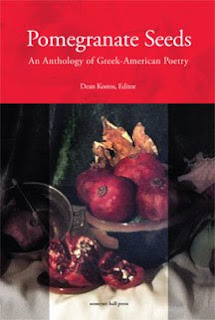
Pomegranate Seeds
An Anthology of Greek-American Poetry
Dean Kostos, Editor
Somerset Hall Press 2008
ISBN 978-09774610-4-2
$19.95
The introduction, preface to this anthology is
informative. Dean Kostos gives us reason to explore
and investigate, not just, the history he refers to in
the preface, but, also, the contents of this anthology
of Greek-American poetry. The poets, and poems are as
diverse as America, and as steeped in pride as Greece.
“We too are inspired not only by our ancient heritage,
but also by its subsequent manifestations, when Greek
culture commingled with others.” The connection
between the poets is their heritage, their voices are,
at once, strong and humble.
Thereafter, a brief biography of each of the forty
nine poets sets up an understanding, the poet’s
relationship drawn between two cultures. In all the
writing, the poems seem inseparable from the poet and
their influences. Pages flow into the next, similar to
a mountain stream after the spring rain. The poems
emerge, overflow, careen down, rich with life the
poems feed our commitment to each other as a whole. I
present a small sampling of some of the accomplished
poet’s poems from ‘Pomegranate Seeds.’
Eleni Fourtouni
“I performed the libation at sunset:
milk and honey, wine and olive oil,
enough for a hundred traitors.
once they played tag…”
John Bradley
“I tell you I didn’t die.
I just never bothered
to turn back”
Ioanna Carlsen
“The bigness of the arc going each way,
never deviating in its rhythm.
the back, the forth
the pen writing its line
and then returning,
starting over again…”
Constantine Contogenis
“Before his father told him
the idea of windows, he
loved both sides of walls, locusts
leaving carapaces, ewes…”
Penelope Karageorge
“…the stones await me.
I swallow them with salt and greens and weep.
Irene Koronas
Poetry Editor
Wilderness House Literary Review
Reviewer: Ibbetson Street Press











































